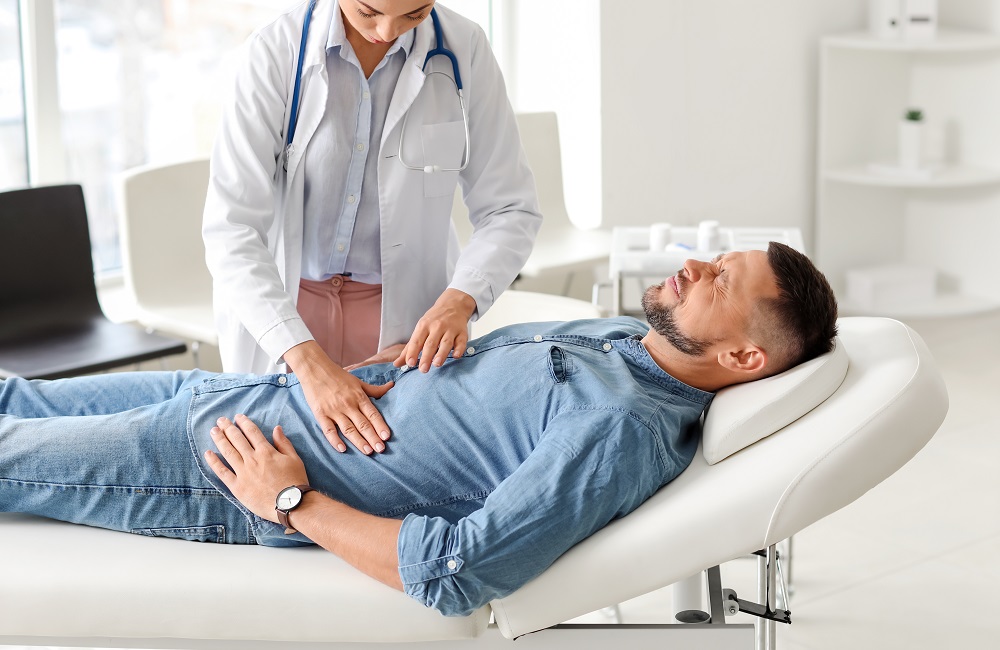What exactly is a
Ulcerative proctitis?
Ulcerative proctitis is an inflammatory bowel disease that is limited to the rectum. It belongs to the group of chronic inflammatory bowel diseases (IBD) and is a mild form of ulcerative colitis.
Ulcerative proctitis causes ulcers on the inner lining of the rectum, leading to various symptoms, including persistent diarrhea, bleeding from the rectum, abdominal pain and the feeling of not being able to empty the bowel completely. Care by an experienced gastroenterologist is usually necessary in order to treat and monitor the disease appropriately.
About the symptoms
More information
Important facts about ulcerative proctitis
Symptoms of ulcerative procitits:
- Persistent diarrhea, possibly accompanied by dehydration
- Bloody stools, possibly also anemia (anemia) due to blood loss in the stool
- Abdominal pain, especially in the lower abdomen
- Feeling of not being able to empty the bowels completely
- Mucus secretion from the rectum
Consequences of ulcerative procitits:
- Impairment of quality of life due to pain and uncontrolled bowel movements
- Spread of the inflammation to other areas of the colon (in untreated cases)
- Increased risk of bowel cancer, especially with prolonged, uncontrolled inflammation
- Influence on social life and professional activities due to symptoms
- Possibility of developing other forms of IBD such as ulcerative colitis as the inflammation progresses
How can ulcerative proctitis be differentiated from other forms of ulcerative colitis?
Localization of the inflammation:
Ulcerative proctitis is limited to the rectum. The inflammation only affects the last part of the intestine and does not spread beyond the rectum.
Ulcerative colitis, on the other hand, can spread to the entire large intestine (colon). The inflammation can extend from the lower sections of the intestine to the entire large intestine and in some cases even affect the transition to the small intestine.
Extent of the inflammation:
In ulcerative proctitis, only the rectum and a small part of the overlying colon are affected. Ulcers develop in this limited area.
Ulcerative colitis, on the other hand, can affect different sections of the colon, whereby the inflammation can be continuous. This leads to a contiguous area of inflammation that can affect the entire colon or only certain segments of it. The symptoms of other forms of ulcerative colitis are therefore much more extensive.
What are the causes of ulcerative proctitis?
The causes of ulcerative proctitis are varied and include both genetic and immunological factors. As ulcerative proctitis is closely related to ulcerative colitis, they share similar causes that can lead to inflammation in the digestive tract. Some of the known causes of ulcerative proctitis, which can also play a role in other forms of IBD, are listed below.
Genetic predisposition
Genetic predisposition
A family history of inflammatory bowel disease (IBD) increases the risk of developing the disease.
Immunological dysregulation
Immunological dysregulation
The body's own immune system mistakenly attacks the intestinal wall and causes inflammation.
Environmental factors
Environmental factors
Factors such as smoking, diet, infections and certain medications.
Intestinal microbiome
Intestinal microbiome
A different composition of the intestinal flora to that of healthy individuals.
Multifactorial development
Multifactorial development
A complex disease in which several factors probably interact to trigger it.
What to do with ulcerative proctitis?
Relaxation techniques and psychotherapy
Stress can exacerbate symptoms, so relaxation techniques such as meditation, breathing exercises or yoga, as well as psychotherapy, can help to manage stress better and improve overall well-being.
Treatment measures
Drug therapy includes anti-inflammatory medication. In more severe cases, immunomodulators or biologics can be used. Surgical removal of the affected part of the bowel may also be necessary. In addition, the doctor may provide a special diet or dietary recommendations to avoid potential trigger foods and ensure a well-tolerated diet.
Information and emergency plan
Educate yourself about your condition and possible treatment options to develop a better understanding of ulcerative proctitis and your individual situation. Develop an emergency plan with your doctor in case your symptoms worsen. Know when to seek medical help.
Sources
Please note that all content provided regarding individual medical conditions, treatments, procedures, etc. is general information and may vary depending on the physician:in and individual case and initial situation.
For more detailed information, please always consult your doctor.
Rohde, H.: Lehratlas der Proktologie: Diagnostik - Therapie - Fallbeispiele. Georg Thieme Publishers, 2007
www.thieme-connect.deGuideline of the German Society of Radiation Oncology: Supportive measures in radiation oncology, status: 2015
www.degro.orgGuideline of the German Society for Gastroenterology, Digestive and Metabolic Diseases (DGVS): Ulcerative colitis - Living Guideline, status: 2020
www.dgvs.de